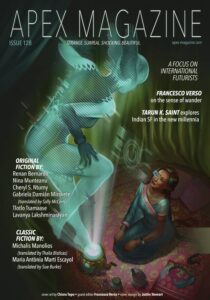No Ending to “Robin’s Last Song”: An Interview with Nina Munteanu
I recently interviewed novelist and short story author Nina Munteanu after her short story Robin’s Last Song was featured by the NYC Climate Writers Collective as part of an exhibition in the Climate imaginarium on Governors Island.
Simon: Congratulations on being featured with the Climate Imaginarium on Governor’s Island. Can you tell us a little about the story and why they are featuring it?
Nina: Sure. Essentially, the story is about a world thrown into unbalance then its struggle to heal again. It features Robin, a blind elder whose digital app failed to warn the world of the sudden global loss of birds with disastrous ecological consequences. After years of living in self-exile and getting around poorly on sight-enhancing technology, a discovery gives her new hope in rekindling her talents in the field of soundscape ecology to help heal the world. The story resonates with elements of how we relate to the climate crisis and our resilience in dealing with change. Despite the story being about disaster, it is essentially optimistic with a focus on our resilience and our hope, two qualities necessary for us during a changing climate.
 Simon: Can you tell us a little bit about the exhibition on Governors Island this summer?
Simon: Can you tell us a little bit about the exhibition on Governors Island this summer?
Nina: I’m told that the Climate Imaginarium exhibition this summer will include climate storytelling and poetry by Climate Café, the Sixth Festival and the Climate Writer’s Collective. There will be shows and art exhibits and even a virtual reality exhibit. Climate Imaginarium serves as a community centre for climate and culture. It has galleries and spaces for exhibitions, performances, film screenings, and events that respond to the climate crisis with solutions and visions for hope and justice. The Climate Imaginarium house opened officially on May 18th of this year and will continue throughout the summer.
Simon: Why do you think stories are important in climate action?
Nina: Our capacity and need to tell stories is as old as our ancient beginnings. From the Paleolithic cave paintings of Lascaux to our blogs on the internet, humanity has always shared story. Story is powerful in how it helps us define who we are, what’s important to us, and where we are going. Stories compel with intrigue, stir our emotions, connect with our souls through symbols, archetypes and metaphor. And stories can inspire action. Surveys have proven that fiction can be deeply persuasive through character journey that convinces at a deeper more emotional and visceral level (as opposed to a litany of facts that appeals only at an intellectual, less engaged, level).
For too long, our stories have promoted a dominant worldview of separation, exploitation and capitalism. We’ve been telling the patriarchal story of “othering” for too long; we need a new voice and a new worldview to replace our old stories of conquering and taming a “savage land” and “savage people.” When we change our stories, we change our lives and we change the world along with it. We are all on a journey, and story plays a role in that journey.
Simon: In a previous interview you did with Apex Magazine, your interviewer Rebecca E. Treasure opened by describing the story as one that explored “extinction, human fallibility, friendship, and the conflict between technology and nature.” She then challenged with whether you thought we’re heading toward the kind of dystopia shown in the story. How did you respond? And do you still feel that way?
 Nina: The story’s narrative was deeply grounded in current realities that involve the kind of dissonance between technology and natural processes—more specifically our myopic use of technological “fixes” to make nature more efficient for our use, whether it’s to mine water from the air (disrupting the water cycle) or gene-hack monocrops to increase yield (compromising the crop’s resilience and long-term productivity). It isn’t so much the technology, but the thought process that drives its use that is undermining the environment we live in. Our unwillingness to think of ourselves as part of the very environment we’re manipulating for shortsighted purposes could certainly bring about some version of this dystopian story. In our journey with Nature, there is so much that we still don’t know about the natural world; so even when it looks utterly bleak and nothing seems left—as I portrayed in “Robin’s Last Song”—Nature can surprise us with hidden gifts and pockets of resilience.
Nina: The story’s narrative was deeply grounded in current realities that involve the kind of dissonance between technology and natural processes—more specifically our myopic use of technological “fixes” to make nature more efficient for our use, whether it’s to mine water from the air (disrupting the water cycle) or gene-hack monocrops to increase yield (compromising the crop’s resilience and long-term productivity). It isn’t so much the technology, but the thought process that drives its use that is undermining the environment we live in. Our unwillingness to think of ourselves as part of the very environment we’re manipulating for shortsighted purposes could certainly bring about some version of this dystopian story. In our journey with Nature, there is so much that we still don’t know about the natural world; so even when it looks utterly bleak and nothing seems left—as I portrayed in “Robin’s Last Song”—Nature can surprise us with hidden gifts and pockets of resilience.
Simon: It almost seems like “Robin’s Last Song” is on its own journey. I understand that the short story has actually been published several times already. In fact I interviewed you before about its publication in Apex Magazine, both the magazine and its anthology. Can you tell us a little about the other publications and how they came to be?
Nina: Oh, that’s going to be a long answer, Simon! Because it really begins with a different story altogether. Shall I continue?
Simon: By all means. I’m intrigued.
Nina: Ok. Well, it started in 2019 with an invite by Oliver Hockenhull, guest editor of subTerrain Magazine to write a piece on technology and the environment. I really wanted to write something about bird population decline—I’d just run across an alarming article in Science Magazine in which researchers estimated that three billion birds of various species had disappeared in Canada and the United States since 1970. That’s a third of the entire bird population lost in five decades. I’d also run across an article about an emerging bioacoustics tool called soundscape ecology that measures biodiversity and the health of an ecosystem through the sound of birds that accurately represent ecosystem health. I wanted to make this story a realizable work of diction in which science and technology play both instigator of disaster and purveyor of salvation. So, I created a premise that involved sudden bird loss, added in this new technology and some irony and submitted my short story entitled “Out of the Silence,” which focused on the technical aspects of the premise and solution. The story received some edits and was published in Issue #85 of subTerrain Magazine in 2020.
Then in 2021, Francesco Verso, guest editor for Issue #128 of Apex Magazine, invited me to submit a story and I submitted “Out of the Silence.” He really liked it but wanted me to rewrite it with a stronger human focus, particularly on the blind elder and her journey. I admit that I toiled with it, but I did finally achieve a rewrite that included a stronger focus on Robin’s personal journey, her connection with birds and the catastrophe, how she coped with Asperger’s syndrome, and how she came to work on the project in the first place. The story was quite different and with the obvious focus on the protagonist, I decided to call it “Robin’s Last Song.”
 Simon: A metaphoric title, then, with several meanings.
Simon: A metaphoric title, then, with several meanings.
Nina: Yes! Exactly. Francesco really challenged me and I think this iteration of the same general story and premise is so much better because of his patient and insightful prodding. It almost feels like “Out of the Silence” was an egg still in a nest and “Robin’s last Song” is a fledgling’s first flight, which went on to be published several times more. First in Apex Magazine’s anthology and then in Metastellar Magazine in January 2024. That was followed by the announcement in May by the NYC Climate Writers Collective that Robin’s Last Song would be in an exhibition in the Climate Imaginarium on Governors Island over the summer of 2024, starting May 18th. Now, with its inclusion in the Climate Imaginarium exhibition, it has morphed yet again into an auditory work. Who knows where this ‘bird’ will fly to next…
Simon: Well, it sounds like “Robin’s Last Song” is still in flight. We’ll keep an eye out. Congratulations and good luck with this story and its journey, Nina.
You can learn more about Nina by visiting her coaching/writing website www.ninamunteanu.me for articles and tips on writing, publishing and marketing & promotion. Readers can also keep up to date on her writing at www.ninamunteanu.ca. Much of her work is eco-fiction involving her background as a limnologist and ecologist. Her site www.TheMeaningOfWater.com provides articles on interesting aspects of the environment, Nina’s own research, all often with a focus on water. You can also find her on Linked In, X, Goodreads, and Wikipedia.




Thanks for the interview, Simon! it was a pleasure talking to you about the writing process.